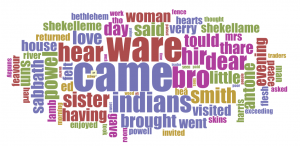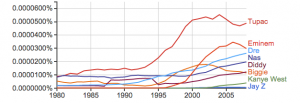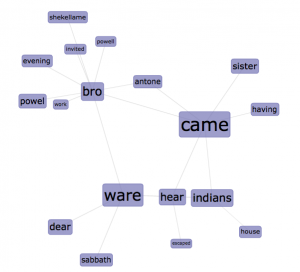Distant reading is not reading from far away, but rather reading the themes of a work. The difference between reading an article and getting the distant reading of an article is similar to looking through a microscope versus a telescope. A microscope gets the details and exact information of a document, while a telescope gives you the broad understanding of

something usually by looking at the work from a distance. Distant reading is great for understanding a quick summary or themes and key words of a work before actually diving in and reading it word for word. “A scholar using this tool could generate a list of poems that share similar criteria and then have the information from this list plotted on a graph with coordinates for, say, date and place of publication” shows that Edward Whitley in Visualizing the Archive understands the importance of distant reading. Distant reading develops patterns in themes and

can relate the work one is reading to others with similar ideas, a very important concept when in need of more understanding of a certain topic.
In the Powell Diaries, brother Powell was a directly related and involved in the events he wrote about. Whether the event happened in his hut or away from his small town, the stuff Powell wrote about in his diaries happened within the day and with him directly hearing about it or seeing it. His work is considered a primary source for events that happened in Pennsylvania during 1748. Powell was very factual when writing in his diary because he was more of an observer rather and Powell did not think his work was going to be used later, therefore he was very thorough and honest. Powell was involved in his culture and wrote thorough ideas about it in his diary.

Each event was documented while Powell showed his life through his diary. In Whitley’s terms, “words are data”, showing that distant reading can give you an idea of what the theme of the article will be about. In Moretti’s terms, distant reading actually provides a “sharper sense of [the] overall interconnection” over “concrete, individual works” again showing how useful distant reading is over simply starting off a project with directly diving into it. More often than not, it is surprisingly useful to get the context of a work before actually beginning to read even a word of it.
Comments
One response to “Distant Reading Can Give the Reader an Overview of the Subject Matter”
Nice work, John! You quoted Moretti! Well done!